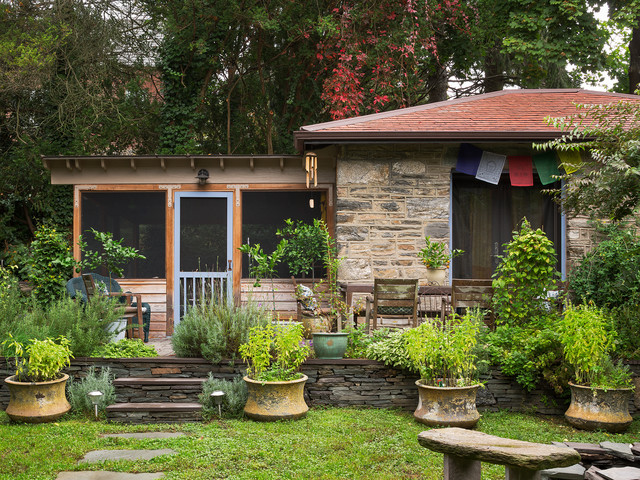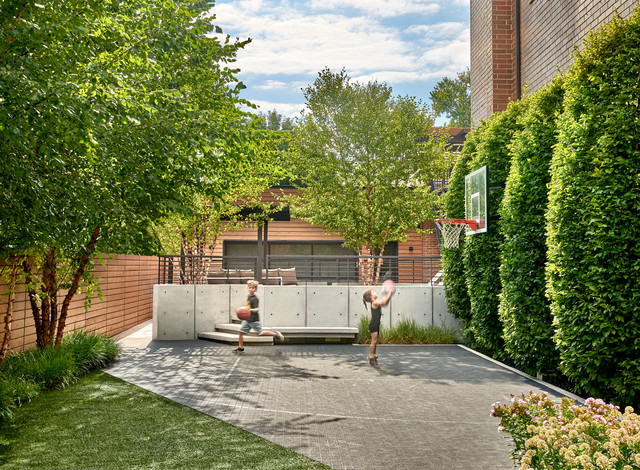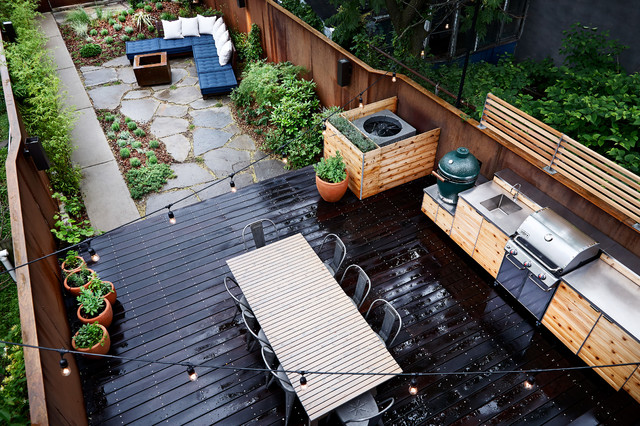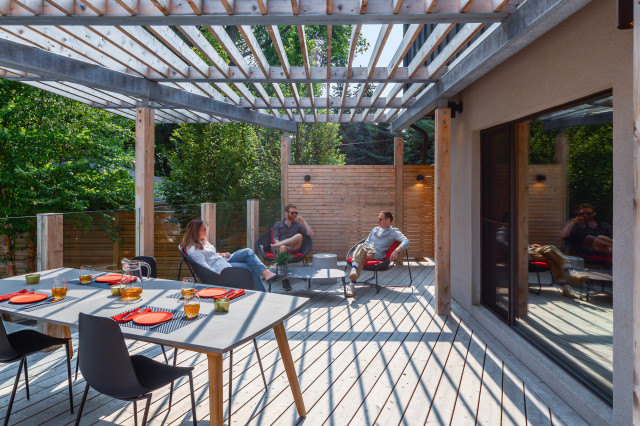Etiquette Rules for Outdoor Living
1. Keep Lighting on the Down Low
When planning outdoor lighting, think about how it will affect your neighbors. Position any bright security spotlights so they don’t shine in their windows and potentially affect their sleep. Angle lights downward and consider using lower-voltage lights with less intensity to avoid creating glare.
Remember your nonhuman neighbors as well when planning lighting. Fixtures such as uplights can negatively affect wildlife. When possible, keep lighting low. Illuminate stairs and benches with LED strip lights and paths with hooded fixtures. Set lights to turn off at a certain time or use motion-activated options. A landscape designer or a skilled landscape contractor can help you create a lighting plan that works for everyone.
And if your neighbors’ lights are creating a problematic glare for you at night, broach the subject in a nonconfrontational way. Assume they aren’t doing it on purpose, and ask if they might consider turning off nonessential lighting overnight.
2. Thank You for Not Smoking
Houzz readers have mentioned in story comments their sensitivity to smoke from wood-burning fire pits and outdoor fireplaces. If you’re planning a fire pit or fire table, locate it away from your neighbors’ homes. You might want to consider a gas or propane model, or a wood-burning fire pit with smokeless technology, like the one seen here from Solo. And invite neighbors to join you for s’mores or drinks outside now and then to include them in the fun.
If you or a family member has respiratory issues and is affected by neighbors’ woodsmoke, let them know in a diplomatic way. If their fires are only an occasional annoyance rather than a health issue, consider letting it go in the interest of neighborly peace.
Houzz readers have mentioned in story comments their sensitivity to smoke from wood-burning fire pits and outdoor fireplaces. If you’re planning a fire pit or fire table, locate it away from your neighbors’ homes. You might want to consider a gas or propane model, or a wood-burning fire pit with smokeless technology, like the one seen here from Solo. And invite neighbors to join you for s’mores or drinks outside now and then to include them in the fun.
If you or a family member has respiratory issues and is affected by neighbors’ woodsmoke, let them know in a diplomatic way. If their fires are only an occasional annoyance rather than a health issue, consider letting it go in the interest of neighborly peace.
3. Watch the Volume on Outdoor TVs and Music Speakers
Outdoor TVs are great for viewing the big game during a barbecue, hosting a movie night or practicing yoga with a virtual teacher outside. But outdoor TVs are not so great for neighbors — the sound can really travel. Be mindful of the volume level and time of day your TV is on.
The same goes for outdoor music. You might love your tunes, but your neighbors might not. If you’re planning a party that could get loud, give neighbors a heads-up, invite them if appropriate or deliver a small gift as a thank-you for their tolerance.
If you have neighbors who regularly crank up the volume to a level that interferes with your enjoyment of your home or yard, ask them politely in a quiet moment to turn it down a bit. Avoid upping the ante with loud noises of your own. If their noise violates local ordinances, you can contact authorities. But be careful not to start a neighbor “war.” And if their TV noise or music is more of an occasional issue or not really that loud, it might be best to tolerate it.
Outdoor TVs are great for viewing the big game during a barbecue, hosting a movie night or practicing yoga with a virtual teacher outside. But outdoor TVs are not so great for neighbors — the sound can really travel. Be mindful of the volume level and time of day your TV is on.
The same goes for outdoor music. You might love your tunes, but your neighbors might not. If you’re planning a party that could get loud, give neighbors a heads-up, invite them if appropriate or deliver a small gift as a thank-you for their tolerance.
If you have neighbors who regularly crank up the volume to a level that interferes with your enjoyment of your home or yard, ask them politely in a quiet moment to turn it down a bit. Avoid upping the ante with loud noises of your own. If their noise violates local ordinances, you can contact authorities. But be careful not to start a neighbor “war.” And if their TV noise or music is more of an occasional issue or not really that loud, it might be best to tolerate it.
4. Keep a Lid on Pool Noise
Speaking of noise, listening to screaming and “Marco!” “Polo!” over and over is a given when there’s a backyard pool where kids play. If you own a pool, keeping reasonable pool party hours and inviting your neighbors over for dips will engender goodwill. Screening with trees and adding a splashing water feature such as a waterfall or a fountain can go a long way toward softening pool noise too.
If you live next door to neighbors with a popular pool, you might have to get used to some summertime noise. If their pool hours are unreasonable, ask them to keep the volume down early in the morning and late at night.
Speaking of noise, listening to screaming and “Marco!” “Polo!” over and over is a given when there’s a backyard pool where kids play. If you own a pool, keeping reasonable pool party hours and inviting your neighbors over for dips will engender goodwill. Screening with trees and adding a splashing water feature such as a waterfall or a fountain can go a long way toward softening pool noise too.
If you live next door to neighbors with a popular pool, you might have to get used to some summertime noise. If their pool hours are unreasonable, ask them to keep the volume down early in the morning and late at night.
5. Be Mindful of Which Way the Wind Is Blowing
Wind chimes are another noise maker that can cause strife. Some people find these tones soothing, and others find them irritating.
Don’t assume that your neighbors will be as happy to hear your wind chimes as you are. Ask them if they are comfortable with the sound of chimes, and if they are, you’re golden. If they’re on the fence about it, place the chimes closest to where you will enjoy them but as far away as possible from their house. Choose a size and material appropriate for your yard so the sound doesn’t travel.
On the flip side, if neighbors’ wind chimes are annoying you, you can ask if they would consider moving them to a different spot. But choose your battles. If you can live with the sound or it’s an issue only on excessively windy days, you might want to live and let live.
Wind chimes are another noise maker that can cause strife. Some people find these tones soothing, and others find them irritating.
Don’t assume that your neighbors will be as happy to hear your wind chimes as you are. Ask them if they are comfortable with the sound of chimes, and if they are, you’re golden. If they’re on the fence about it, place the chimes closest to where you will enjoy them but as far away as possible from their house. Choose a size and material appropriate for your yard so the sound doesn’t travel.
On the flip side, if neighbors’ wind chimes are annoying you, you can ask if they would consider moving them to a different spot. But choose your battles. If you can live with the sound or it’s an issue only on excessively windy days, you might want to live and let live.
6. Show You’re a Team Player
Some noise is to be expected when kids play outside in summer. An outdoor basketball court adds another dimension. When possible, place basketball hoops away from property lines, or place tall shrubs or trees around the area to dampen the sound. Limit kids to reasonable hours of play so your neighbors are not awakened by the sound of balls bouncing on pavement.
Conversely, if you live next door to basketball enthusiasts whose scrimmages are cutting into your shut-eye, you can mention it to them if they’re adults, or to their parents if they’re kids. But keep in mind that everyone needs exercise. And if the noise is coming from kids, remember that summer is prime time for them to get outside and play. Remember you were a kid once too.
Some noise is to be expected when kids play outside in summer. An outdoor basketball court adds another dimension. When possible, place basketball hoops away from property lines, or place tall shrubs or trees around the area to dampen the sound. Limit kids to reasonable hours of play so your neighbors are not awakened by the sound of balls bouncing on pavement.
Conversely, if you live next door to basketball enthusiasts whose scrimmages are cutting into your shut-eye, you can mention it to them if they’re adults, or to their parents if they’re kids. But keep in mind that everyone needs exercise. And if the noise is coming from kids, remember that summer is prime time for them to get outside and play. Remember you were a kid once too.
7. Don’t Forget Your ‘Petiquette’
While you love your furry friends, your neighbors might not. If your dog barks a lot, be considerate about the times of day and night you let it out into the yard. Consider walking your dog away from the house instead or monitoring early-morning and late-night bathroom breaks.
If you have an outdoor cat who likes to wander, be aware that it might be doing its business in neighbors’ herb gardens or killing the birds they love to feed. If either of these things is the case, consider installing a cat fence or keeping your cat indoors.
If you’re not a fan of your neighbors’ pets — you don’t like animals or are annoyed by the “gifts” they leave behind — take a breath. If there’s an issue with droppings left behind or vegetation being disturbed, set boundaries and let the owners know. Tell them if you’re afraid of the animal or allergic to it. But remember that, as with neighborhood kids, some tolerance is going to be required.
While you love your furry friends, your neighbors might not. If your dog barks a lot, be considerate about the times of day and night you let it out into the yard. Consider walking your dog away from the house instead or monitoring early-morning and late-night bathroom breaks.
If you have an outdoor cat who likes to wander, be aware that it might be doing its business in neighbors’ herb gardens or killing the birds they love to feed. If either of these things is the case, consider installing a cat fence or keeping your cat indoors.
If you’re not a fan of your neighbors’ pets — you don’t like animals or are annoyed by the “gifts” they leave behind — take a breath. If there’s an issue with droppings left behind or vegetation being disturbed, set boundaries and let the owners know. Tell them if you’re afraid of the animal or allergic to it. But remember that, as with neighborhood kids, some tolerance is going to be required.
8. Be Considerate About Composting
Gardening is a popular pastime, and some folks like to take it a step further and make their own compost. Composting can enrich the soil while reducing waste, promoting healthy plant growth, giving the garbage disposal a break and eliminating the need for store-bought fertilizer. However, composting has a few drawbacks — it can get a bit stinky and attract pests such as rats. If you’re a composter, place the pile in a spot where the smell won’t affect your neighbors. And use a critter-proof system to prevent varmints from coming around.
If your neighbors’ compost pile is creating a smell or causing pest issues, let them know and ask them to keep the area tidy or use a different system. Chances are, they wouldn’t be happy about pest infestations either.
Gardening is a popular pastime, and some folks like to take it a step further and make their own compost. Composting can enrich the soil while reducing waste, promoting healthy plant growth, giving the garbage disposal a break and eliminating the need for store-bought fertilizer. However, composting has a few drawbacks — it can get a bit stinky and attract pests such as rats. If you’re a composter, place the pile in a spot where the smell won’t affect your neighbors. And use a critter-proof system to prevent varmints from coming around.
If your neighbors’ compost pile is creating a smell or causing pest issues, let them know and ask them to keep the area tidy or use a different system. Chances are, they wouldn’t be happy about pest infestations either.
9. Place Structures Thoughtfully and Be a Good Host
When adding an outbuilding like a backyard studio or an accessory dwelling unit (ADU), don’t just adhere to local codes or homeowners’ association restrictions and call it a day. Think about how the siting will affect your neighbors. This includes considering their views, their privacy and the building’s attractiveness. The yoga studio seen here is a good example of considerate siting. It’s in the back corner of the yard, and it’s almost invisible to neighbors. When leaves fall, all neighbors will see is a hint of the building’s low roof and its attractive shingles and siding. The materials blend into the woodsy corner.
While we’re on the topic of ADUs, let’s talk about etiquette with overnight visitors and renters. If you host visitors regularly or rent out an ADU, be sure the temporary occupants are considerate toward your neighbors. Share guidelines with guests before they arrive. Address topics such as noise levels, acceptable noisy-activity hours and parking, and enforce the rules.
If you live next door to a property with an outbuilding used for guests or tenants, let the owner or property manager know about any conduct abuses. Many times the person in charge will want to know so he or she can deal with the issue. If the owner is unresponsive, you can contact the authorities or rental service. Keep your cool for the best outcome.
When adding an outbuilding like a backyard studio or an accessory dwelling unit (ADU), don’t just adhere to local codes or homeowners’ association restrictions and call it a day. Think about how the siting will affect your neighbors. This includes considering their views, their privacy and the building’s attractiveness. The yoga studio seen here is a good example of considerate siting. It’s in the back corner of the yard, and it’s almost invisible to neighbors. When leaves fall, all neighbors will see is a hint of the building’s low roof and its attractive shingles and siding. The materials blend into the woodsy corner.
While we’re on the topic of ADUs, let’s talk about etiquette with overnight visitors and renters. If you host visitors regularly or rent out an ADU, be sure the temporary occupants are considerate toward your neighbors. Share guidelines with guests before they arrive. Address topics such as noise levels, acceptable noisy-activity hours and parking, and enforce the rules.
If you live next door to a property with an outbuilding used for guests or tenants, let the owner or property manager know about any conduct abuses. Many times the person in charge will want to know so he or she can deal with the issue. If the owner is unresponsive, you can contact the authorities or rental service. Keep your cool for the best outcome.
10. Extend an Invitation — or an Olive Branch
Of course the best way to create peace and harmony with your neighbors is by getting to know them so you can maintain good communication. Let them know if you’re having a big event. Bring them some flowers or veggies from your garden to soften the blow. If you’re having a neighborhood get-together, be sure to invite them. And if you’re on the receiving end of a neighbor’s complaint, ask what you can do to improve the situation, and make a good-faith effort to follow through on the answer.
If your neighbors’ outdoor activities are bothering you, wait until you’re calm to address it. Think of possible solutions and then approach them for a neighborly chat. Whether it’s kids playing, dogs barking or a TV that’s extra loud during the World Cup, you’re going to have to allow for some give and take. Extend the kind of tolerance and consideration that you’d appreciate receiving. Ask if there’s something you can do for them in exchange for a compromise.
And finally, accept that some situations defy easy resolution. It’s the reality of living with neighbors.
Of course the best way to create peace and harmony with your neighbors is by getting to know them so you can maintain good communication. Let them know if you’re having a big event. Bring them some flowers or veggies from your garden to soften the blow. If you’re having a neighborhood get-together, be sure to invite them. And if you’re on the receiving end of a neighbor’s complaint, ask what you can do to improve the situation, and make a good-faith effort to follow through on the answer.
If your neighbors’ outdoor activities are bothering you, wait until you’re calm to address it. Think of possible solutions and then approach them for a neighborly chat. Whether it’s kids playing, dogs barking or a TV that’s extra loud during the World Cup, you’re going to have to allow for some give and take. Extend the kind of tolerance and consideration that you’d appreciate receiving. Ask if there’s something you can do for them in exchange for a compromise.
And finally, accept that some situations defy easy resolution. It’s the reality of living with neighbors.









Comments
Post a Comment